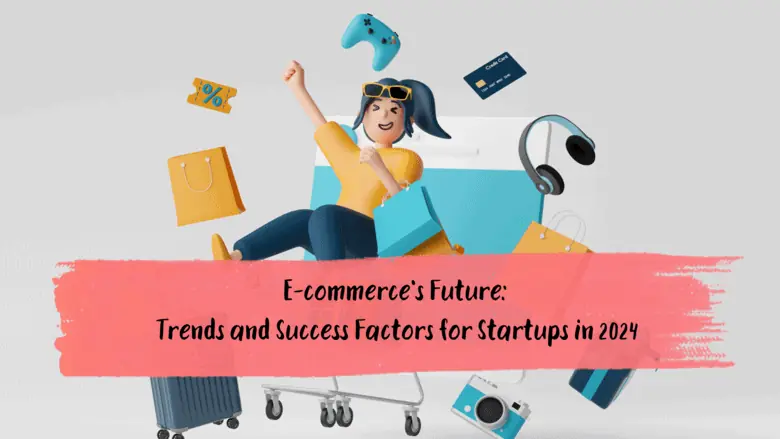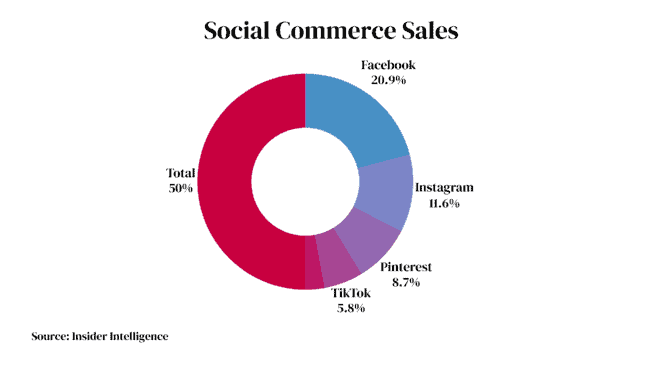E-commerce’s Future: Trends and Success Factors for Startups in 2024

E-commerce continues to expand rapidly, transformed by emerging technologies and evolving consumer behaviors. With global e-commerce sales projected to reach $7.4 trillion by 2025, up from $2.9 trillion in 2018, the opportunities are immense for innovative startups.
For startups launching in this dynamic space in 2024, distinctive success factors will set thriving brands apart. Adapting to key trends from mobile dominance to virtual reality to social commerce will be imperative. By leveraging vital data-driven and operational strategies, new entrants can position themselves at the forefront of e-commerce’s future.
This article will uncover how startups can flourish amid intensifying digital disruption and fragmentation.
The Rise of Social Commerce Platforms
Social media is turning into a new place to shop. Sites like Instagram Shopping and TikTok Shop let startups connect with customers and make sales. By 2024, social media will be the top spot for people to shop online. These new shopping places help startups grow fast. By showcasing exciting products on social sites, startups can rapidly gain attention and boost sales. Partnerships with influencers keep helping startups too.
But just moving old shopping ways to social media doesn’t work now. Startups have to make creative campaigns tailored for each platform. They must tailor these designs for each community on the platforms. Using features like Instagram Reels and TikTok Duets helps startups stand out from the crowd. The most successful startups will be those that engage with and contribute to these online communities, rather than merely selling products. They will engage and join the communities. Social commerce gives startups big opportunities today. Startups have to go where the customers are – on social media.
Authenticity as a Tool Against Social Scam Concerns
While social sites speed up growth, gaining consumer trust is still key. With all the e-commerce on social now, customers often worry about scams.
> “Over 60% of young consumers actively avoid social media purchases due to scam worries. This shows authenticity and trust are crucial in social commerce.” [Blend Commerce]
Startups must focus on authenticity to ease these concerns. This involves showcasing genuine user reviews and social conversations, not merely polished promotions. Community engagement through reviews, questions, and chats also builds trust.
Furthermore, startups should create ads specifically tailored for each social platform, rather than recycling the same content across different sites. Clear communication about shipping, pricing, and policies brings credibility. Startups that balance sales and authenticity on social will earn loyalty.
Revolutionizing Customer Service Through Direct Messaging
Customer service models are changing to meet modern expectations. Today, more customers want to talk directly to brands through messaging apps like WhatsApp or social media. Approximately 60% of people say they prefer to contact brands directly instead of calling support lines. This shows that people want personalized, instant responses.
So startups need to update how they handle customer service. Having people to answer questions on messaging apps is becoming necessary. However, effective messaging-based support must be personal, empathetic, and prompt.
Chatbots powered by AI can instantly solve common problems. But for complicated questions, the human touch is still important. Startups that use both automation and real agents to answer messages will gain loyal happy customers.
For startups diving into the dynamic world of customer service, transitioning smoothly to direct messaging becomes a breeze with the support of a startup branding agency. This partnership not only guarantees a personalized, caring, and prompt response to customer queries but also ensures that the messaging experience harmonizes seamlessly with the overarching brand identity, cultivating loyalty and satisfaction among customers.
Predictive Personalization in E-commerce
Just understanding customers isn’t enough anymore. In 2024 and beyond, startups need to predict what each customer wants – even before they know it.
65% of people now expect companies to adapt to their changing preferences. This shows that predictive personalization in e-commerce is important.
So startups need to shift from basic to predictive personalization. Using data about what customers browse and buy can identify their interests and predict what they’ll want later. AI systems can then suggest products, content, and experiences matched to each shopper.
However, customers dislike overt data-driven targeting. Predictive suggestions need to feel coincidental, not forced. Startups require technology not only for making accurate predictions but also to create experiences that feel intuitive and natural. Winners will be those who can satisfy needs customers weren’t even aware of yet.
Focus on Cross-Selling for Customer Retention
While some marketing trends are new, building customer relationships is still important. In 2024, startups need to focus on strategic cross-selling to existing customers.
Selling additional products to current customers grows order values. It also helps prevent losing customers later when they need something new. If people buy multiple product types from a brand, they’ll likely keep shopping there.
Startups should study purchase histories to find cross-sell opportunities for individuals. Suggesting complementary products, bundles, or discounts can get customers to try more items.
Emails and advertisements tailored to recent purchases are also effective for cross-promotion. However, subtlety is key; overly aggressive sales campaigns can alienate loyal customers. Done right, cross-selling is a win-win.
The Evolution of Subscription Models
Subscription e-commerce has grown fast. But in 2024, just copying subscription services won’t be enough. With more competition, startups need to make subscriptions flexible and valuable.
Curated monthly subscription boxes are popular for surprising customers and connecting brands. However, receiving the same static box each month can become monotonous. Smart startups are personalizing boxes and adding variety. Letting subscribers customize or pause shipments also feels more valuable.
Beyond product offerings, subscriptions should focus on service perks to build loyalty. For example, subscribers could get access to a community, exclusive content, or early sales.
The crucial aspect is to blend convenience with tangible benefits. Startups that make subscriptions exciting experiences, not just routine sales, will stand out in the long run.
The Impact of Short-Form Video
In 2024, video commerce is growing, but polished commercials aren’t what will connect with shoppers. Instead, fun entertaining short videos like on TikTok can showcase products and brands.
For startups, short videos offer opportunities across the customer journey. Playful unboxings bring products to life. Bite-sized tutorials educate on usage and benefits. Shoppable recipe videos can inspire more purchases.
User reviews and demonstrations also offer valuable free marketing. Additionally, short social video advertisements efficiently target interested buyers.
High quality still matters, but authenticity sets brands apart. Startups that use short videos for creative storytelling will make memorable shopping moments and inspire sales.
Final Thoughts
Even as AI and data enable more tailored outreach, startups need to keep the personal touch. By seamlessly integrating these seemingly contradictory elements, forward-looking startups will emerge as the standout online retail brands in the coming years. The winners will harness automation while speaking to customers as real people, not data points. This blend of technology and personalization is poised to shape the next generation of e-commerce success stories.
Frequently Asked Questions
-
How can startups effectively use AI in e-commerce?
View AI as optimizing human effort, not replacing it. Use it to analyze data and surface insights, while letting marketers craft creative execution. Chatbots can rapidly solve common customer issues, but human agents should still handle complex questions. Overall, AI should free up staff for high-level strategy.
-
What builds consumer trust in social commerce?
Trust requires authenticity in social selling. Feature genuine user reviews rather than curated promotions. Ensure ads fit each platform organically. Radical transparency around policies and operations also nurtures credibility. Promptly resolving issues and engaging sincerely with commenters builds goodwill. Do this well and social platforms become thriving, trusted marketplaces.
-
How can startups balance sustainability with profits?
Implement small tweaks first. Eco-packing, like recycled mailers or paper tape, makes a difference without much cost impact. Optimizing supply chains to reduce emissions also matters. Allowing second-hand resale lays the groundwork for a circular model. Although larger initiatives might require more investment, many shoppers are willing to pay slightly more for sustainable options. Communicating green efforts also attracts conscious consumers, driving ROI. Through creative approaches, startups can make decisions that are sustainable both environmentally and financially in the long term.
Explore the power of words and the beauty of expression at www.wordplop.com – where creativity meets the digital realm.







